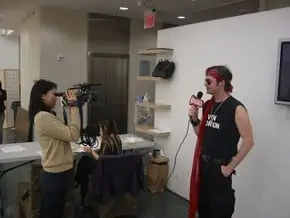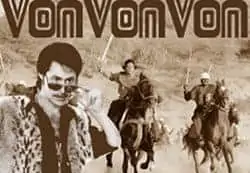A comedian is a performance artist who uses humour to entertain audiences.
The history of performance comedy dates back to 425BC in ancient Greece, where comedic writers and performers entertained audiences to motivate political change.
Today, there exist many types of comedy, with modern forms of comedic performance such as observational, satirical and “alternative” comedy shows able to bring in strong numbers of fans.
Some comedy performers even progress to become household names.
The process of becoming more recognised requires many years of gigging the club circuit in large centres of population.
Comedians often use a booking agent or manager in order to secure paid gigs, although self-motivated individuals will be able to track down pub gigs and even some paid corporate events.
Weddings, birthdays, anniversaries and functions can all be useful sources of income, although most comics aim for regular paid slots at specific comedy clubs which pay more for each performance.
Salary
Comedians are always paid a flat rate for the night’s performance, and this can be anything from £50 for amateurs up to several thousand pounds for comics who are able to draw a crowd.
Jongleurs is an example of a well-established comedy club chain which is known to offer good rates to performing artists.
There are also exceptional gigs on offer for comedians who have a good reputation and are able to open successfully for big-name stars.
This is often how the next generation of up-and-coming acts are spotted and thrust into the limelight.
Top rates of pay are incredibly favourable for household name artists, but it takes many years to progress to this potential pay scale.
Responsibilities
- Arrive at the venue on time
- Dress appropriately for the venue and routine
- Write and rehearse lines where applicable
- Be able to improvise and work with an unpredictable crowd
Qualifications
There are no formal academic qualifications for candidates who wish to perform comedy.
This is because comic timing and improvisation is the result of intrinsic personality combined with life experience; it is not something that can be learned from a text book.
Most comedians learn the art and develop their own style by studying successful comics in various forms; live stand-up shows, movies, TV and comedy festivals are the typical sources of inspiration.
YouTube has been revolutionary, in the respect that it is a useful tool for developing comics to study performers they like and also learn about new and unknown comedy acts.
Some comics get into this career after studying for a performing arts academic qualification, but it is usually of limited use in terms of the specific demands of delivering a funny routine.
Skills
- Improvisation and adaptation
- A strong sense of humour and an ability to convey it to people who have a different sense of comedic style
- Must be comfortable performing to a large crowd
- Must have excellent motivational skills to work an audience that is not “switched on”
- Must be prepared to evolve constantly and improve the act to keep the performance fresh over many months or years
Working Conditions
Professional comedians often remark that it is much more difficult to perform to a small crowd.
This is because laughter can be regarded as a contagious bug; the more people who are there to enjoy the show, the higher the chance that the whole audience will become wrapped up in the performance.
This is a career where the whole purpose is to entertain, so the comedian must be happy standing in the spotlight with several hundred pairs of eyes staring back; it is not for the faint-hearted or the publicity-shy.
Early shows can be very stressful for the performer, just as with any performing art.
Experience

Time spent on the comedy tour yields several benefits: increased personal income per show, a growing reputation, repeat bookings, an evolving act and the sense of being more comfortable working in the limelight.
New entrants discover very early on if this is something they can do or not.
The first few years are often used as valuable time spent working on one’s act; if the comic is performing character acting, it can take a long time for that character to develop into a recognisable and likeable personality.
Some comics just have a knack for standing up on stage and being themselves, whereas for others, the delivery of a comedic routine is more scientific.
This involves a lot of time at home working on material and understanding what makes people laugh; this is the Steve Coogan approach to comedy, be it characterised comedy or not.
Career Progression
As with many performing arts, the longer the time spent gigging and rehearsing, the more chance the talent has of being spotted and thrust under the spotlight in a large, well-known venue.
It takes time to build a reputation, just as it can take a long time to develop one’s act.
Early years are spent trudging the circuit round the grottier clubs and pubs, just in an effort to make some money and develop a routine.
The candidate should have a basic knowledge of self-promotion and the ability to network in order to secure more profitable slots.
Employers
Jongleurs is the most successful and renowned comedy club in the UK.
This chain of venues offers a range of different nights, and often makes an effort to promote up-and-coming local talent.
Big nights are reserved for the big names, however, so it pays for the candidate to consider smaller venues where they can get regular paid work before progressing to these larger, high-profile venues.
Image

Also known as…
- Stand-up
- Stand-up comedian
- Gag artist
- Comic
Related Jobs
What’s it really like?
Hugh Gallagher is a popular comedian who has made many television appearances in the United States under his stage name, VonVonVon.
He currently works across South East Asia in a freelance capacity.
What made you decide or choose to get into this sort of career?
I was just trying to meet girls.
Do you have a standard day or a standard type of ‘exercise’?
75 push-ups every other day, crunches and cardio.
Moderate drinking, meditation, prayer and a lean, balanced diet.
What is the most common type of problem/call-out/enquiry to which you must attend?
If you sing and dance, most people think you’re gay.
Otherwise, it’s a lot of fun.
What do you like most about the job?
Laughing with others.
The chance to meet other people in the same industry, to compare your act to theirs, and try and develop your routine, your own style.
It’s important that you keep developing your act to avoid becoming stagnant.
YouTube has been a great innovation in terms of taking your act to a wider audience.
I’ve been established for a long time now, so this is all I know.
What do you like least about the job?
That manager in Istanbul who wants me dead.
Seriously, you meet a few people in the industry from time to time who, “lead you up the garden path,” and then don’t deliver when it comes time for you to collect.
You’re often better off being self-managed, at least for the early part of your career.
What are the key responsibilities?
Staying alive and staying thin.
Making people laugh, keeping a roof over your head, moving around, entertaining people, building your career and trying not to take things too seriously.
What about academic requirements? Any formal demands, eg- A Levels?
Alas, there is no school for this.
I would suggest the VonVonVon Levels.
However, total mastery of the art of love, familiarity with magic tricks, a smattering of foreign languages (French, German, Japanese, etc), the ability to moonwalk, and rudimentary sound studio knowledge, by which I mean, whether to “throw” or “delay” vocal tracks, and the sublime power of a properly applied envelope filter (“wah”).
Electronic toys and gadgets can add a great deal to your live performance, and require a little technical knowledge before you are able to apply them to comic effect; well, in an intentional way, anyway.
What is the starting salary, and how does this increase over time with promotion?
If you keep the lights on, you’re doing great.
Promotion means you’re eating, too.
It’s pretty much like that.
You need to hustle and keep moving around, especially in the early days when you do not have a name that is worth anything.
Later on, the work comes looking for you, which is both a good and bad thing.
What advice do you have for someone who is looking to get into this as a career?
Be rich, lucky, and cute.
What are the most important qualities an applicant must and should possess?
They like ‘em young and dumb.
If you can’t be both, be one.
Any closing questions, comments or additional advice?
If you’ve got a stable job with good benefits that doesn’t make you feel like your face is melting, you’re doing pretty well in life.
Otherwise, there is comedy.










